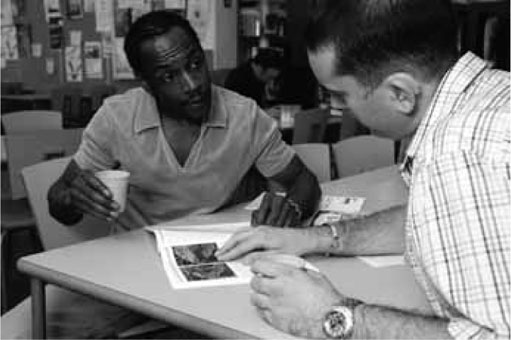1.3.1 Planned conversations
There are many reasons why you might choose not to conduct an interview with people, especially if you work with them. First, unless they’re aware of your undertaking an educational project, the request for an ‘interview’ will seem just plain strange! And if it feels strange to them that may well affect what they say to you. Second, especially when you are undertaking a practice-centred inquiry, the people you might need to talk with may not believe they have the time for a formal interview, whereas they’ll be relaxed ‘chatting’ with you for ten minutes. Thirdly, there may well be times when you don’t want your informant to be aware that your questions to them are part of a coherent project. Now, this point raises some important issues about the ethics of an inquiry process and we’ll have to return to that topic later in the book, but for now the point I want to make is that how open you are about your intentions in asking questions will affect the answers you are given, and this all has to go into the mix as you make sense of the information you gather through interviews.
So what are the important points to consider as you plan an informal conversation as a method for gathering information?
What’s the best place and time?
I once had a manager who would always argue with me and try to show that any new idea of mine wasn’t any good. He seemed determined to win arguments. So whenever I wanted to suggest a new idea to him, I’d find out when he would be on his way to a meeting and I’d ‘chance’ to bump into him in the corridor. ‘Oh George,’ I’d say, ‘I know you haven’t the time to talk now but I’m thinking of doing xyz;’ (I’d mention some sort of new plan;) ‘could we talk about it later?’ He’d say yes and hurry off to his meeting. Later he’d come to my office and always be in a different kind of mood. Somehow he’d want to encourage me or, maybe, the idea had become his own.
Whatever the reason, he would be far more open to the new idea and usually really helpful and wise. In the same way, if you are looking to ask a colleague, client or boss a question, you have to think what time and place would be the best to get a thoughtful and helpful answer. Maybe the canteen at lunchtime or just as work is slowing down at the end of a shift ... you will have some ideas about the best time and place to ask your question.
How many questions can you ask?
This, again, is a question of judgement and you might have to change your mind at the very moment of a conversation! By and large you won’t be able to ask too many questions without your respondent feeling ‘got at’, so think that through and be ready to read the signs if you’re pressing your luck during the conversation. It might be worth trying to ask different questions on different occasions rather than trying to get every question asked at one time.
Declaring your intentions
This can be a tricky question and it leads back to the issue of our ethical responsibility, which I’ve discussed elsewhere. How much should you tell a colleague about your project before asking him or her your questions? There are several points to consider:
- Is it fair to use someone’s thoughts in a project when they weren’t aware of what you were doing?
- If they had known you were trying to do something they disagreed with, might they have given a different answer?
- Might you lose the sense of open and informal conversation if you indicate that there is a project lurking behind your ‘innocent’ question?
These are important questions of ethics and practicality. Seeking to balance the relative importance of each issue is not easy and will require some careful thinking.
Are you just a questioner or are you giving of yourself?
Just asking questions can create a very one-sided conversation. Sometimes, if you want someone to talk freely, then you will need to be open yourself. If you want someone to ‘think out loud’ then you may need to do the same or they will feel that you are taking advantage of them. This, however, causes a real quandary to an inquirer, for disclosing your own point of view on a matter might influence the answer you’re given. There is no straightforward solution to this. If you were an external researcher coming into an organisation, it would be much easier to be detached and dispassionate, but practice-centred inquiries are generally done within your own organisation where the apparent objectivity that some researchers desire is just not possible. David Coghlan, in the reading ‘Insider action research projects’ at the end of this book, discusses this problem.

